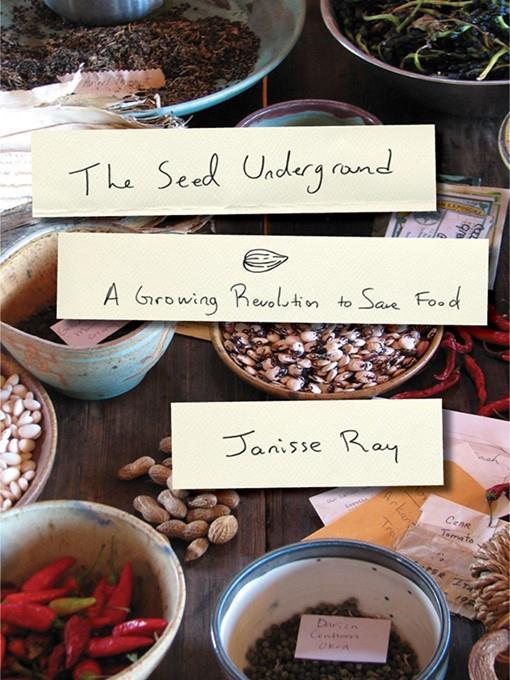
The Seed Underground
A Growing Revolution to Save Food
کتاب های مرتبط
- اطلاعات
- نقد و بررسی
- دیدگاه کاربران
نقد و بررسی

Starred review from June 4, 2012
In this enchanting narrative—part memoir, part botany primer, part political manifesto—Ray, author of the acclaimed Ecology of a Cracker Childhood, and lately returning to her childhood obsession with farming, has a mission: to inspire us with her own life to “understand food at its most elemental... the most hopeful thing in the world. It is a seed. In the era of dying, it is all life.” Ray is inspired by the eccentric, impassioned, generous characters she visits and interviews, gardeners and farmers who populate the quietly radical world of seed savers, from Vermonter Sylvia Davatz, self-proclaimed ‘“Imelda Marcos of seeds,”’ to the more phlegmatic Bill Keener of Rabin Gap, Ga., who gives Ray two 20-inch cobs of Keener corn, grown by his family for generations, as well as Greasy Back beans and some rotten Box Car Willy tomatoes to save for seed. Despite the book’s occasional tendency toward polemic, avid gardeners will relish recognizing their idiosyncratic, revolutionary sides in its pages, and it’s likely to strike a spark in gardening novices. Even couch potatoes will be enthralled by Ray’s intimate, poetically conversational stories of her encounters with the “lovely, whimsical, and soulful things happen in a garden, leaving a gardener giddy.” Agent: Sam Stoloff, Frances Goldin Literary Agency.

July 1, 2012
A naturalist's rally for the preservation of heirloom seeds amid the agricultural industry's increasing monoculture. Ray (Drifting into Darien: A Personal and Natural History of the Altamaha River, 2011, etc.) unabashedly proclaims that seeds are "miracles in tiny packages." Through accounts of her own journey in saving them, as well as facts and anecdotes, she urges readers to consider the practice, in order to avoid genetic erosion, to improve health, to work against a system that determines and limits availability, and more. Without stridence, Ray forthrightly presents her case, advocating for small organic farmers and less corporate dependence. In her most persuasive chapters, she recounts her travels in Georgia, Vermont, Iowa and North Carolina to meet others involved in saving specific varieties. She emphasizes the importance of diversity and also the ways in which preservation becomes a cultural resource; each seed bears a singular history that is often not only regional, but familial. Readers new to the topic will find that Ray's impassioned descriptions skillfully combine discussions on plant genetics and the metaphorical potential of seeds. Alternating between science and personal stories of finding her own farm, attending a Seed Savers Exchange convention, and increasing activism, the author also includes a brief section on basic seed saving and concludes with chapters that confront the idea of the homegrown as merely idyllic. With a nod toward Wendell Berry, this work emphasizes the importance of individuals working as a community. Recommended for experienced gardeners--guerrilla or otherwise--and novices searching for alternatives to processed, corporatized food.
COPYRIGHT(2012) Kirkus Reviews, ALL RIGHTS RESERVED.

July 1, 2012
Nature writer and advocate Ray continues her thoughtful exploration of rural life with this timely look at heirloom seeds. After sharing some startling statistics (in the last 100 years, 94 percent of seed varieties available in America have been lost), she delves into why and how we have become so dependent upon such a small group of seeds and why this lack of diversity poses such a threat. Ray wisely buttresses facts with personal experiences, recounting the development of her own seed-saving habits, then introducing farmers and gardeners across the country who share their often generations-spanning histories of seed preservation. These personal perspectives of homespun habits stand in stark contrast to industrial agriculture and support Ray's argument that the American food system is broken and these are the sorts of people who can show us how to fix it. She succeeds beautifully on all counts, evincing a firm grip on science, history, politics, and culture as she addresses matters of great significance to all of us.(Reprinted with permission of Booklist, copyright 2012, American Library Association.)

























دیدگاه کاربران